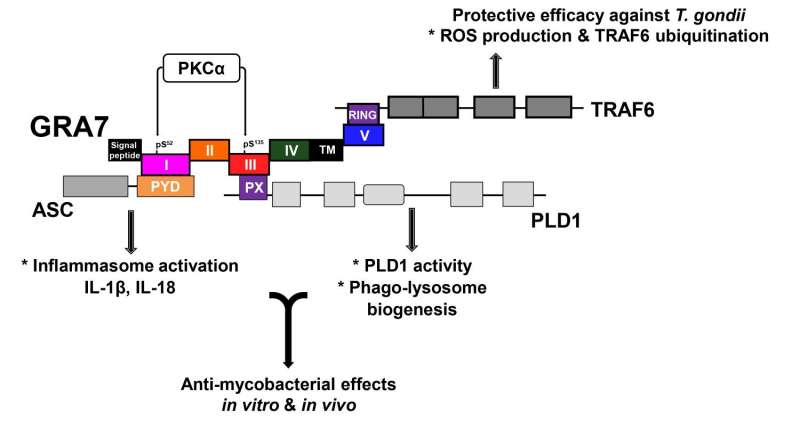Parasite protein could help inform new anti-tuberculosis strategies

Proteins produced by the parasite that causes toxoplasmosis may be involved in immune system processes that can help fight mycobacteria, according to a new study. The findings, published in PLOS Pathogens, suggest that these proteins could potentially play a role in new treatment strategies for tuberculosis.
Tuberculosis infects millions worldwide and kills over two million people each year, mostly in low-and middle-income countries. To improve treatment strategies, scientists have proposed the use of host-directed therapies, which target processes in the human body that help mycobacteria survive and thrive, rather than directly targeting the bacteria themselves.
In the new study, Hyun-Jung Koh and colleagues at Hanyang University in South Korea suggest that proteins produced by a different pathogen, the parasite that causes the disease toxoplasmosis, could play a role in the development of host-directed tuberculosis therapies.
The scientists reported that mycobacteria-infected mice and human cell lines were treated with recombinant GRA7 to investigate the activity of GRA7 proteins, which are produced by the parasites after they infect a host cell. They found that a host protein called PKCα is essential for interactions between GRA7 and host proteins known as ASC and PLD1.
These interactions are known to contribute to anti-tuberculosis defense mechanisms, suggesting the potential for development of GRA7-based host-directed tuberculosis therapies. However, this study was performed in mice and human cells, not in tuberculosis patients, and further research is needed to better understand the molecular role of GRA7 in humans.
More information: Koh H-J, Kim Y-R, Kim J-S, Yun J-S, Jang K, Yang C-S (2017) Toxoplasma gondii GRA7-Targeted ASC and PLD1 Promote Antibacterial Host Defense via PKCα. PLoS Pathog 13(1): e1006126. DOI: 10.1371/journal.ppat.1006126


















